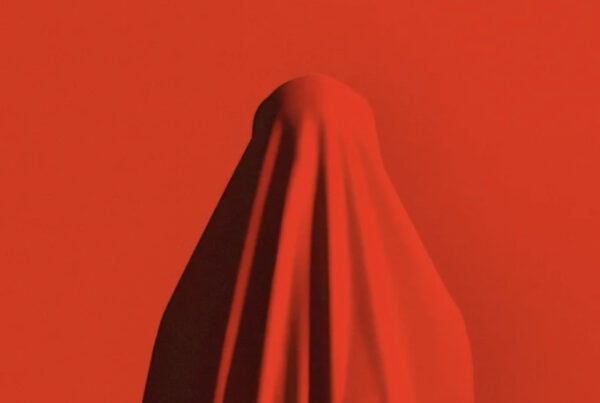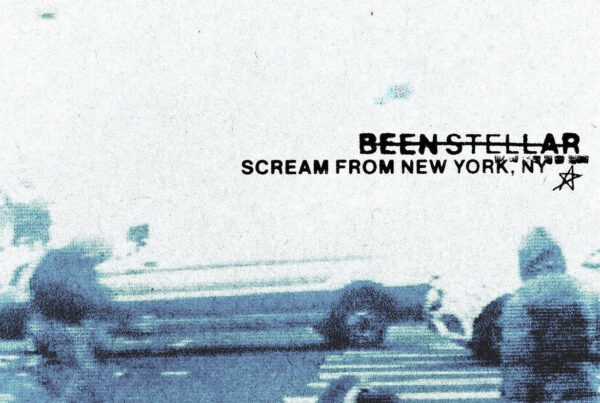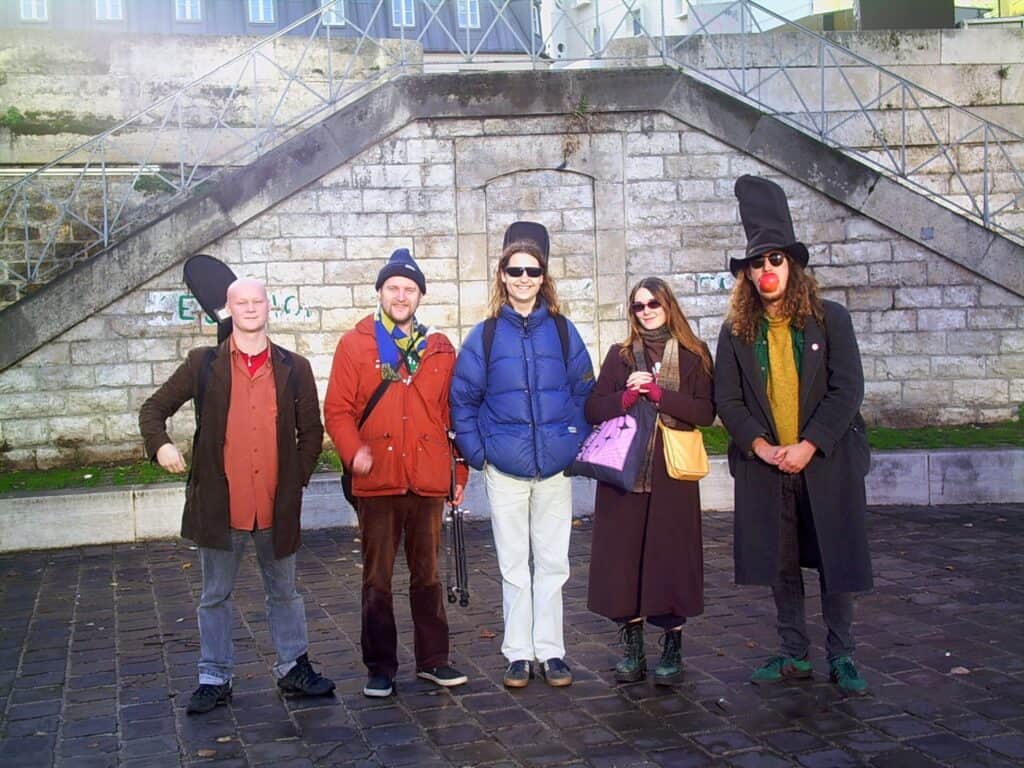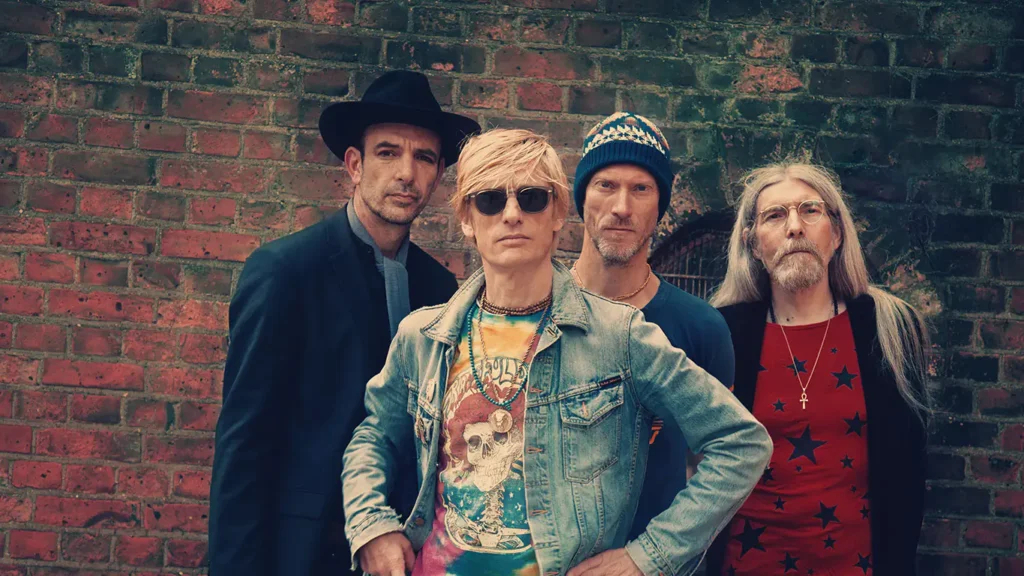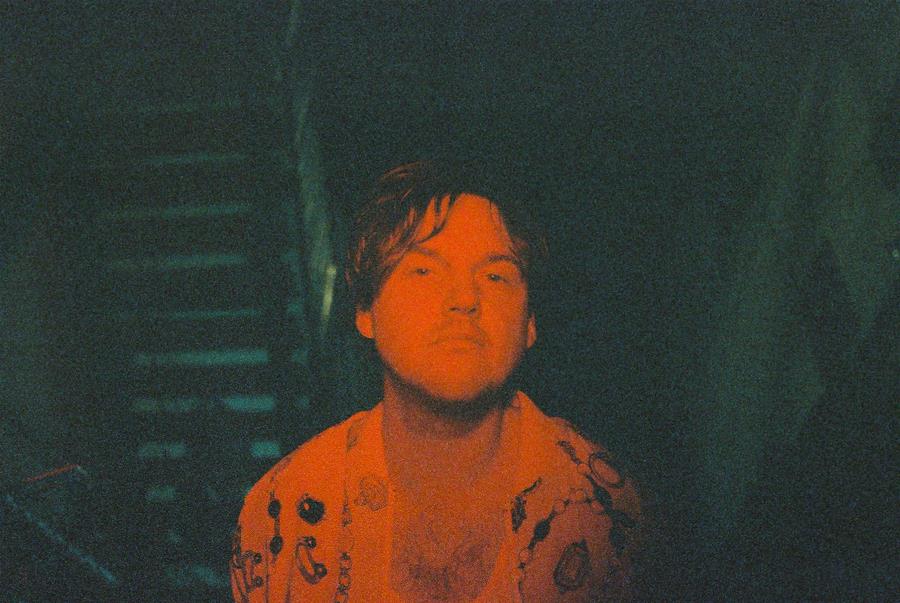‘This Is Sisterhood’ is a life raft for survivors to hold onto. It is a song that stares down the barrel of a gun and dares it to shoot.
A song that will catch a bullet in its teeth and spit it back out.

Poignant, passionate, and pulsing with attitude: Nadia Javed lyrics on Solidarity Not Silence’s latest track ‘This Is Sisterhood’ is a feminist call to arms and a refusal to bow down. Solidarity Not Silence are a riot grrrl supergroup that have banded together to raise funds for the legal costs of fighting a defamation claim. The claim itself was made by The King Blues frontman Jonny Fox, also known as ‘Itch’ – who has had multiple allegations of abuse made against him.
Composed of members of The Tuts, Petrol Girls, Personal Best and Colour Me Wednesday, as well as punk legend Kathleen Hanna of Bikini Kill, the collaboration creates a chorus of voices that challenge the patriarchal norms allowing the music industry to protect predators. Pulling back the curtains to reveal the dark underbelly of the music industry, the stirring anthem invites unity and asks the all-important question recently highlighted by the #MeToo movement: “When will men’s reputations be valued over our safety?”
The single verbalizes the four-year battle that she and multiple other women have endured since they spoke out about the allegations made towards the King Blues frontman.
We catch up with singer and lyricist Nadia Javed, to discuss the mental strain the case has had on the defendants, the hushed abuse of the music industry and what has given her hope recently.
Nadia highlights the real problem of the music business is that it does not protect its workers from exploitation. Without the presence of a Human Resources department that they can go to for help in complex situations, musicians like her are forced into using methods that could land them in hot water legally. Though the #MeToo movement has provided support to many sexual assault survivors it also has established a culture in which survivors feel they must reveal allegations publicly to millions in order to protect others or be believed.
“What choice do you really have other than speak up, use your voice, use your platform?” she asks. “In our situation, when you do use your voice, you do use your platform to raise an issue, you then face the risk of being sued – which is what’s happened with us. “With us, we’ve not been able to get legal aid… we’ve had no choice but to Crowdfund for our legal fees.”
The outpouring of support from the public is undoubtedly a testament to the changing nature of society; kindness and generosity are forces that truly can overpower cruelty. But it’s not just your average Tuts fan that has lent a helping hand with the legal fees. Punk icon Kathleen Hanna of Bikini Kill lent her voice, platform, and support, so that the case could get more publicity – massively elevating the track and putting it on the radar of industry giants.
On working with Kathleen Hanna, Nadia’s voice is tinged with awe. She recalls the surprise she felt when Kathleen answered her DM on social media and revealed she too was a fan of The Tuts.
“I was just like ‘Hey I’d love to send you a CD.’ And she was like ‘Oh my god I love the band!’ and I was like okay, wow I didn’t know that, like just blown away. So, I posted her some stuff and then that’s how the relationship began.”
Following the wholesome exchange, The Tuts got booked as a support act for Bikini Kill’s reunion shows at Brixton Academy.
“When we were there, we obviously got talking and yeah she showed a lot of solidarity. She gave us a £1000 cash that day! Her manager like walked into our dressing room and gave us £1000 cash towards the Crowdfunder for our legal fees and we were just totally blown away by her generosity,” gushes Nadia.
“She went on to talk about Solidarity Not Silence on stage as well and was just so supportive and we captured it on camera. We took that audio from that videotape and put it into the song – obviously with her permission and everything. She was like yeah course and that’s how she became an official feature on the track! I’m just blown away that she has shown so much support and has grabbed people’s attention – you see the words ‘Kathleen Hanna’ and people go ‘what?’. I’m still overwhelmed that she’s on it. It is so brave of her to be forward with her support because some people have shied away.”
Addressing the responses to the track, Nadia is focusing on the mass amount of support the Solidarity Not Silence received from the public. However, she also voiced her frustration at some of the performative activism she witnessed surrounding the issue the track was spotlighting. Big artists who have previously claimed to support the #MeToo movement were silent on Solidarity Not Silence collab and cause – despite having seen and liked posts about the song.
“There are people out there with big platforms who kind of do support causes like this and do speak up about stuff like this but then haven’t shown support for this,” she says. “I do sometimes feel a little bit disappointed, and I do wish those people would, but equally I kind of understand a little bit.
“If another artist were to back us up publicly and slip up and say something wrong and repeat an allegation, they could potentially be at risk of being sued. So, in that sense I don’t blame people for not wanting to get in trouble or get sued ‘cos it’s expensive. But then on the other hand, if more people show solidarity, what’s he gonna do? Sue us all?”
Though the stress of the case already had a huge strain on her mental health, Nadia expresses that the ordeal has brought her back to faith somewhat. Despite admitting to having fallen out of touch with her Muslim identity for a few years, she credits the inception of the song as being somewhat spiritually induced.
“That night I was in bed and I was praying. I was like ‘please help me write this song, use me to get this out.’ And the next day I kid you not, I grabbed my guitar and it wrote itself within minutes. It just happened. When those moments happen, it’s just incredible because I can’t really remember – when you’re in it, you’re in it. The song just wrote itself.”
“When I say I pray, I literally just talk to god in English and just communicate the way I do, sometimes I write letters in my journal and address them to god. I just have my own way of connecting,” she elaborates.
Despite the support she received from the public and several friends, Nadia admits to the additional battle of obtaining support from her family.
“When my mum found out she went crazy… She was like ‘you call him up right now, you apologise and get rid of this right now!’ And then she was like ‘give me his number – I’ll call him. Give me his number!’ And I was just like ‘oh my god’ ‘cos for ages I kept it quiet but then it started to go public, and I was like they’re gonna find out. Even to this day there are certain members of my family who are like ‘why did you get involved in this? Why did you poke your nose in?’”
“Even if you’re doing it [because] you believe in something, like, it’s still a horrible thing to go through. So yeah, it is really difficult to get support from family. But I think my mum eventually came around. ‘Cos my mum’s like strong woman – she’s a fighter. That’s where I get it from.”
While Nadia deeply understands her family’s concerns having described the process of being sued as “horrible”, her resilience to keep fighting in spite of financial incentives to give up, shows an authentic punk spirit that so many of us are looking for from young feminist bands. Solidarity Not Silence doesn’t stop with the King Blues lawsuit – the case could set a precedent for how UK Law around defamation intersects with survivors speaking out about alleged abuse.
“There are three main reasons as to why we released this track,” she says. “Number one – to raise funds for our legal fees. Number two – we want to raise awareness of the wider issue within the music industry and just in general. Number three – I want people to connect with the song as survivors, for them to feel heard. It’s like a way of saying ‘I believe you’. it’s also a way of them feeling less lonely.”
“I still standby what I said, I don’t want to publicly take that back and apologise because I wouldn’t mean it. I just feel like it just sent out such a wrong message and you know what, I just can’t do it,” she says.
Moving on from the case and onto the topic of her influences – mainly 90s pop and rock – Nadia concludes that The Tuts are an amalgamation of The Libertines and Spice Girls. With a pink bubble-gum aesthetic and lyrics that are doused in angst and revolt, it’s not hard to see how The Tuts have been influenced by both bands. She elaborates on one experience of seeing The Libertines live that was particularly transformative:
“The next day, they raised my vibration to a next level,” she says. “When I left that gig, I felt like a different person. When I went to school the next day…I had like a bit of a bounce to my stride. Like I was walking differently, they really gave me so much energy.”
“I actually used to go watch loads of bands that were just full of white dudes and at the time I loved it. I loved it – it was great. They had so much confidence – I wanted to be like them! I wanna be like that white man! The thing that I love about The Libertines is that they were so messy on stage and it made me think ‘they can barely play their own instruments! I can do that!’” she teases.
On what she’s reading at the moment, Nadia gestures towards Daring Greatly by Brené Brown and Brown Baby by Nikesh Shukla. She is particularly enthusiastic about Secrets of Divine Love: A Spiritual Journey into the Heart of Islam by A. Helwa, stressing that is a must-read that brought her closer to God, though simultaneously, she expresses timidity at her spiritual turnaround.
“In my family I was seen as the rebel and the one who didn’t care much. So, when I did start to connect a bit with religion, I did feel like, almost embarrassed – shy of it. But that one’s really good – I keep it by my bed. Honestly, anyone reading that would take away so much from it.”
Her frankness about her personal development is truly refreshing. She describes her thirties as being an epoch of vulnerability and reflection, suggesting that the trauma she brushed aside in the flurry of her twenties had caught up with her. When asked what she’d say to her twenty-year-old self or any other young musician, she strongly stresses the value of being confident in your abilities, regardless of what social media might suggest.
“If you put your worth and value in how many likes you get then you’re putting it into the hands of other people who like your pictures. And then if your pictures doesn’t get that many likes you’re like oh my god you’re not worth anything.”
“Don’t wait for anybody to give you any opportunities. ‘Cos sometimes we can sort of wait for that email to come through or wait for them to ask us to write that book we wanna do, or wait for the record deal so we can… no, no, no. Do your shit. Just get on with it. Connect with people. Use your contacts around you. Don’t wait for anybody to give you opportunities…Never be ashamed or afraid to be yourself and to be vulnerable cos that is actually strength. Through that you will connect with people.”
So, what’s next for Nadia Javed? She suggests that there isn’t much in the pipeline for The Tuts currently, explaining that they felt they had burnt themselves out with the drama of the court case and the financial strain of the lawsuit. Despite this, she is adamant that she will continue with music alongside her day job, hinting that solo tracks like ‘I Hate Boris’ may be released on streaming services in the next year or so.
“When the time is right it’ll happen, but it would be nice to get some things off the plate and make room for things. But I am really hopeful about that – that’s another thing that gives me hope.
This Is Sisterhood was released on 4th May on Alcopop Records. Listen to the track and buy merch to support the cause here:
https://solidaritynotsilence.bandcamp.com/track/this-is-sisterhood
Check out the full interview with Nadia here:


